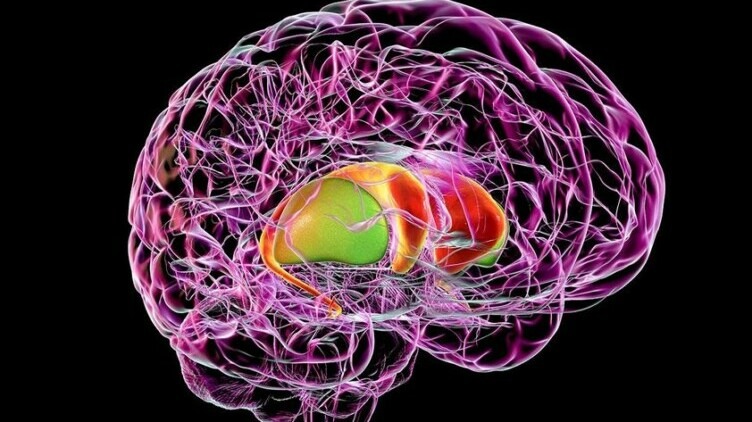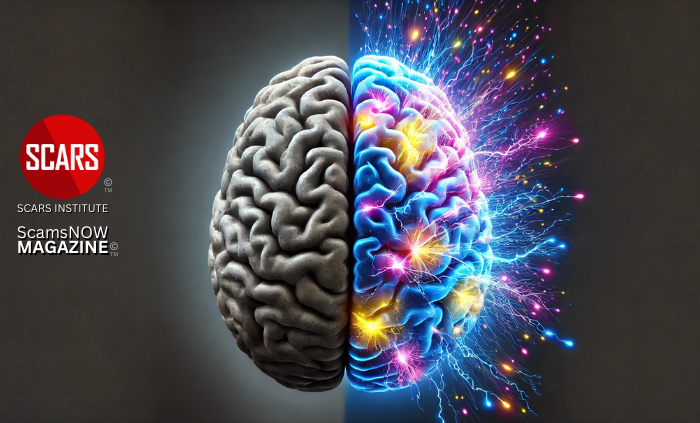Striatum – Inside the Brain of a Scam Victim
Psychology of Scams
Authors:
• Vianey Gonzalez – Licensed Psychologist Specialty in Crime Victim Trauma Therapy, Neuropsychologist, Certified Deception Professional, Psychology Advisory Panel & Director of the Society of Citizens Against Relationship Scams Inc.
• Tim McGuinness, Ph.D. – Anthropologist, Scientist, Director of the Society of Citizens Against Relationship Scams Inc.
Striatum – Our Journey Into The Brain Of Scam Victims Continues
The striatum is a cluster of interconnected nuclei that form a part of the basal ganglia, a group of structures in the brain that are involved in motor control, habit formation, reward, and decision-making.
What the Striatum is
The striatum has a number of important functions, including:
- Motor control: The striatum is involved in planning, initiating, and executing voluntary movements. It also helps to coordinate movements from different parts of the body.
- Habit formation: The striatum plays a key role in habit formation. When we repeat a behavior over and over again, the striatum strengthens the neural connections that support that behavior. This makes it easier for us to perform the behavior in the future, even without thinking about it.
- Reward: The striatum is also involved in reward processing. When we experience something rewarding, the striatum releases dopamine, a neurotransmitter that is associated with pleasure and motivation. This helps us to learn and remember behaviors that are likely to lead to rewards.
- Decision making: The striatum is also involved in decision-making. It helps us to weigh the pros and cons of different options and to select the option that is most likely to lead to a reward.
The striatum is a critical component of the brain that plays a role in a wide range of functions. Damage to the striatum can lead to a variety of problems, including movement disorders, difficulty forming habits, and difficulty making decisions.
Here are some specific examples of how the striatum is involved in different functions:
- When you decide to pick up a cup of coffee, your striatum helps you to plan and execute the movement.
- When you drive to work every day, your striatum helps you to form a habit of this behavior.
- When you eat a delicious meal, your striatum releases dopamine, making you feel pleasure and motivating you to eat similar meals in the future.
- When you are deciding which job offer to accept, your striatum helps you to weigh the pros and cons of each offer and to select the offer that is most likely to lead to a rewarding career.
- When you send money to your scammer, your striatum helped you decide if it is a good idea!
The striatum is a complex and fascinating structure that plays a vital role in our everyday lives, and in enabling the scam that almost destroys victims’ lives.
The Role of the Striatum in Romance Scams:
The striatum is involved in romance scams (and other relationship scams, including pig butchering scams and more) because it is involved in reward processing and habit formation.
When a scammer contacts a victim and begins to build a relationship with them, they are triggering the release of dopamine in the victim’s striatum. This dopamine release creates a sense of pleasure and motivation in the victim, which makes them more likely to continue interacting with the scammer.
The scammer will often use a variety of tactics to keep the victim engaged, such as complimenting them, telling them lovey-dovey things, and making promises about the future (amygdala hijacks.) These tactics will continue to release dopamine in the victim’s striatum, making them even more attached and controllable by the scammer.
In other words, the Striatum is one of the beneficiaries of Amygdala Hijacks – it plays a crucial role in luring in and grooming victims.
Over time, the victim’s brain will form a habit of interacting with the scammer. This means that the victim will start to crave the dopamine release that they get from interacting with the scammer, and they will be more likely to ignore red flags and warnings from others. That craving, along with others, is what we mean by an addiction during the relationship scam.
The scammer will then eventually ask the victim for money, gifts, or other favors. The victim will be more likely to comply with these requests because of the dopamine release that they get from interacting with the scammer and the habit that they have formed.
The striatum also plays a role in decision-making. The victim is less likely to think critically about the situation and make rational decisions because of the dopamine release in their striatum. This makes them more vulnerable to the scammer’s tactics. This is like a conditioning to not resist what the scammer wants.
Here are some specific examples of how the striatum is involved in romance scams:
- When a victim receives a message from a scammer, their striatum releases dopamine, making them feel good.
- When the scammer compliments the victim or tells them lovey-dovey things, their striatum releases even more dopamine, reinforcing their attachment to the scammer.
- Over time, the victim’s brain forms a habit of interacting with the scammer, making them crave the dopamine release and more likely to ignore red flags.
- When the scammer asks the victim for money or other favors, the victim is more likely to comply because of the dopamine release and the habit that they have formed.
- The victim is less likely to think critically about the situation and make rational decisions because of the dopamine release in their striatum, making them more vulnerable to the scammer’s tactics.
It is important to note that the striatum is not the only part of the brain that is involved in romance scams. Other parts of the brain, such as the amygdala and the prefrontal cortex, also play a role. However, the striatum is a key player in the reward processing and habit formation that are involved in romance scams.
By the way, it is the Striatum that also allows you to recognize and get a joke! It is your funny bone!
The Role the Striatum plays in Overcoming Guilt, Shame, or Embarrassment
The striatum plays a role in overcoming the guilt, shame, or embarrassment that almost all scam victims feel in the days following the discovery that they were scammed.
These emotions are associated with negative reinforcement, which can suppress dopamine release in the striatum. Over time, this can be used to weaken the neural circuit for the emotion, making it less likely that we will experience the emotion in the future. In other words, it helps with habituation or desensitization.
Additionally, the striatum is involved in habit formation. If we can develop new habits that are associated with positive reinforcement, we can help to strengthen the neural circuit for those habits and make them more likely to occur in the future. This can help us to overcome guilt, shame, or embarrassment by replacing them with more positive emotions.
Here are some specific ways to work with the striatum to overcome guilt, shame, or embarrassment:
- Identify the triggers for your guilt, shame, or embarrassment. What are the situations or events that typically make you feel these emotions?
- Develop new habits that are incompatible with guilt, shame, or embarrassment. For example, if you tend to feel guilty about taking time for yourself, you could develop a habit of taking a few minutes each day to relax and de-stress.
- Reward yourself for engaging in new, positive habits. This will help to strengthen the neural circuit for those habits and make them more likely to occur in the future.
- Be patient and persistent. It takes time to change our habits and overcome negative emotions. However, if you are consistent with your efforts, you will eventually see results.
It is also important to remember that guilt, shame, and embarrassment are normal human emotions. Everyone experiences these emotions from time to time. The key is to not let these emotions control us. By working with the striatum, we can develop new habits and overcome these negative emotions.
If you are struggling to overcome guilt, shame, or embarrassment on your own, please consider seeking professional help. A therapist can help you to understand the root of your emotions and develop healthy coping mechanisms. You can find counseling or therapy resources at counseling.AgainstScams.org
The Striatum when the Scam Victim engages in Anger-Driven Activities
After a relationship scam ends, victims are often pulled towards anger and all that follows it. This is, in part, because anger can act as a coping mechanism that can help victims feel more in control. However, it takes a heavy toll on both the victim and their relationships.
When a scam victim engages in anger-driven activities, the striatum can become activated. This is because the striatum is involved in reward processing and motivation. Anger can be a powerful motivator, and it can trigger the release of dopamine in the striatum.
This dopamine release can create a sense of pleasure and satisfaction, which can reinforce the anger-driven behavior. This can lead to a cycle of anger and aggression, as the scam victim seeks out opportunities to express their anger and to experience the dopamine release that it brings.
This includes such activities as:
- Shaming and blaming (exposing) scammers
- Vigilante activities
- Scam Baiting
- Clustering an Anger focused groups
- Relentless scammer hunting
In addition to activating the striatum, anger can also activate other parts of the brain, such as the amygdala and the prefrontal cortex. The amygdala is involved in processing emotions, and it can play a role in the escalation of anger. The prefrontal cortex is involved in decision-making and impulse control, and it can be impaired by anger, making it more difficult for the scam victim to control their behavior.
As a result of these changes in the brain, scam victims who engage in anger-driven activities may be more likely to experience the following:
- Difficulty controlling their anger
- Increased aggression
- Impulsive behavior
- Poor decision making
- Difficulty forming and maintaining relationships
- Physical and mental health problems
If you are a scam victim and you find yourself engaging in anger-driven activities, it is important to seek professional help. A therapist can help you to understand and manage your anger, and they can teach you healthier ways to cope with the trauma of the scam.
Here are some tips for managing anger in a healthy way:
- Identify your triggers: What are the things that typically make you angry? Once you know your triggers, you can start to develop strategies for avoiding them or coping with them in a healthy way.
- Practice relaxation techniques: Relaxation techniques such as deep breathing and meditation can help to calm your mind and reduce anger.
- Express your anger in a healthy way: There are a number of healthy ways to express anger, such as talking to a trusted friend or family member, writing in a journal, or exercising.
- Seek professional help: If you are struggling to manage your anger on your own, a therapist can help you to develop healthy coping mechanisms.
It is important to remember that recovery from a romance scam takes time. Be patient with yourself and seek support from others. With time and effort, you can heal from the trauma of the scam and build a happier and healthier life.
The Striatum and Scam Victims in Denial
The Basic Role The Striatum Plays in Reinforcing Denial
Yes, it works in both anger-driven activities and denial. Once the victim selects their path, the striatum then reinforces it and provides the dopamine to keep the victim following it.
The striatum plays a role in scam victims’ denial by releasing dopamine when they engage in activities that support their denial, such as rationalizing their actions, blaming others, or minimizing the severity of the scam. This dopamine release reinforces the denial behavior and makes it more likely that the victim will continue to engage in it.
For example, a scam victim who has been scammed out of a large sum of money may deny that they have been scammed in order to avoid the emotional pain of admitting that they have made a mistake by talking to a stranger. They may rationalize their actions by telling themselves that they were just trying to make a good investment, or that they were tricked by a very convincing scammer. They may also blame others, such as their own family and friends, for not warning them about the scam.
All of these activities release dopamine in the striatum, which reinforces the denial behavior and makes it more difficult for the victim to accept the reality of the situation.
In addition to the striatum, other parts of the brain are also involved in denial, such as the prefrontal cortex, which is responsible for decision-making and impulse control. When people are in denial, they may have difficulty thinking clearly and making rational decisions. This can make them more susceptible to continuing to engage in the scam, even when they know that it is wrong. Or, worse still, to engage in the same behaviors again but expecting different results and being scammed again and again.
If you are a scam victim, it is important to be aware of the role that the striatum plays in denial. If you find yourself engaging in denial behaviors, such as rationalizing, blaming, or minimizing, it is important to seek professional help. A therapist can help you to understand your denial and develop healthy coping mechanisms.
Other Parts of the Brain are involved in Denial and Reinforcing Reality Avoidance for Scam Victims
In addition to the striatum, other parts of the brain that are involved in denial and reinforcing reality avoidance for scam victims who cannot or will not accept that they were scammed include:
- Prefrontal cortex: The prefrontal cortex is responsible for decision-making, impulse control, and planning. When people are in denial, they may have difficulty thinking clearly about the situation and making rational decisions. This can make them more likely to continue to engage in the scam, even when they know that it is wrong.
- Amygdala: The amygdala is involved in processing emotions such as fear, anxiety, and anger. When people are in denial, they may experience strong negative emotions such as shame, embarrassment, and guilt. The amygdala can amplify these emotions, making it difficult for people to accept reality.
- Hippocampus: The hippocampus is involved in memory and learning. When people are in denial, they may have difficulty remembering the events of the scam, or they may distort their memories in order to support their denial.
- Insula: The insula is involved in processing interoceptive awareness, which is the awareness of our internal bodily sensations. When people are in denial, they may experience physical sensations such as a racing heart, sweating, or nausea. The insula can amplify these sensations, making it difficult for people to focus on reality.
These brain regions work together to create a powerful denial system that can make it difficult for scam victims to accept the truth. This is why it is so important for scam victims to seek professional help. A therapist can help them to understand their denial and develop healthy coping mechanisms.
Here are some specific ways that these brain regions contribute to denial and avoidance of reality for scam victims:
- Prefrontal cortex: The prefrontal cortex is responsible for inhibiting impulsive behaviors. When people are in denial, their prefrontal cortex may be less active, making them more likely to engage in impulsive behaviors such as continuing to send money to the scammer.
- Amygdala: The amygdala can release stress hormones such as cortisol and adrenaline when people are in denial. These hormones can impair cognitive function and make it difficult for people to think clearly.
- Hippocampus: When people are in denial, their hippocampus may have difficulty forming new memories. This can make it difficult for them to learn from their mistakes and avoid being scammed again in the future.
- Insula: The insula can produce unpleasant physical sensations when people are in denial. These sensations can make it difficult for people to focus on reality and make rational decisions.
It is important to note that denial is a complex process that is not fully understood. The brain regions involved in denial are likely to vary depending on the individual and the specific circumstances of the scam. However, the research on denial suggests that the brain regions listed above play an important role in this process.
We will talk about the other parts of the brain in future articles.
The Role of the Striatum in Recovering from Romance and Other Types of Scams
The striatum plays a role in scam victims recovering from the trauma and grief that were caused by a romance scam by helping them to learn from their experiences and form new, healthier habits.
When a scam victim first learns that they have been scammed, they often experience a range of emotions, including shock, anger, sadness, and shame. These emotions can be very overwhelming and can make it difficult for the victim to cope.
The striatum can help the victim cope with these emotions by releasing dopamine when they engage in positive activities. For example, when the victim talks to a therapist, spends time with loved ones or engages in hobbies that they enjoy, their striatum will release dopamine, making them feel good. This positive reinforcement can help the victim to start to heal from the trauma of the scam.
BUT THIS ONLY WORKS IF THE SURVIVOR PLAYS AN ACTIVE ROLE IN THEIR OWN RECOVERY, ESPECIALLY IN THERAPY AND SUPPORT GROUPS. BEING PASSIVE NEGATES THE POSITIVE EFFECTS.
The striatum can also help the victim to form new, healthier habits. For example, the victim may decide to start a journal to track their thoughts and feelings, or they may decide to start attending a support group for scam victims. These new habits can help the victim to process their emotions and to learn from their experiences.
Over time, the victim’s striatum will help them to rewire their brains and form new associations between positive activities and rewards. This will help the victim to recover from the trauma of the scam and to build a more resilient life.
Here are some specific examples of how the striatum can help scam victims recover from the trauma and grief that were caused by a romance scam:
- When a scam victim talks to a therapist, their striatum releases dopamine, making them feel good. This positive reinforcement can help them to cope with the emotional distress caused by the scam.
- When a scam victim spends time with loved ones, their striatum releases dopamine, making them feel connected and supported. This can help them to heal from the betrayal and isolation that they may have experienced as a result of the scam.
- When a scam victim engages in hobbies that they enjoy, their striatum releases dopamine, making them feel happy and fulfilled. This can help them to rebuild their sense of self-worth and to find joy in life again.
- When a scam victim starts a journal to track their thoughts and feelings, their striatum releases dopamine, making them feel productive and in control. This can help them to process their emotions and to learn from their experiences.
- When a scam victim starts attending a support group for scam victims, their striatum releases dopamine, making them feel connected to others who understand what they have been through. This can help them to reduce their feelings of shame and isolation.
The striatum is a powerful part of the brain that can be used as a tool that can help scam victims recover from the trauma and grief that were caused by a romance scam.
By understanding how the striatum works and by engaging in positive activities, scam victims can rewire their brains and build a more resilient life.
Working with the Striatum to Develop Beneficial Habits and Behaviors
Remember, the striatum is a part of the brain that plays a key role in habit formation and learning.
There are a number of things that we can do to work with the striatum to develop beneficial habits and behaviors:
- Make the behavior rewarding. The striatum is more likely to encode a behavior as a habit if it is associated with a reward. This reward can be anything that makes us feel good, such as eating a delicious food, completing a task that we are proud of, or spending time with loved ones.
- Repeat the behavior. The more often we repeat a behavior, the stronger the neural connections in the striatum become. This makes it easier for us to perform the behavior in the future, even without thinking about it.
- Make the behavior cue-driven. A cue is a stimulus that triggers a habit. For example, the cue for the habit of brushing our teeth might be seeing the toothbrush and toothpaste in the bathroom. The more consistent we are with associating the cue with the behavior, the more likely we are to perform the behavior automatically.
Here are some specific tips for using these principles to develop beneficial habits and behaviors:
- Identify the habit that you want to develop. What is one behavior that you would like to do more often, or that you would like to do more consistently?
- Make the behavior rewarding. Find a way to make the behavior enjoyable or rewarding for yourself. This could be something as simple as giving yourself a small compliment for completing the task, or taking a break to do something that you enjoy after completing the task.
- Repeat the behavior regularly. The more often you repeat the behavior, the stronger the habit will become. Try to schedule the behavior into your day at a specific time and place.
- Make the behavior cue-driven. Identify a cue that you can associate with the behavior. For example, if you want to develop the habit of exercising every morning, you could set out your workout clothes the night before. Or, if you want to develop the habit of eating healthy meals, you could keep healthy snacks on hand at work or school.
It is important to try to develop new habits. It takes time for the striatum to encode a behavior as a habit. However, if you are consistent with repeating the behavior and associating it with a reward, you will eventually find that the behavior becomes easier and more automatic.
Here are some additional tips for working with the striatum:
- Break down large tasks into smaller steps. This will make the task seem less daunting and more achievable.
- Start small. Don’t try to change too many habits at once. Focus on one habit at a time.
- Celebrate your successes. When you complete a habit, take a moment to celebrate your success. This will help to reinforce the behavior and make you more likely to do it again in the future.
By following these tips, you can work with the striatum to develop beneficial habits and behaviors that will help you to live a healthier and happier life.
What is Dopamine and what does it do in the Human Brain
Dopamine is a neurotransmitter, which is a chemical messenger that allows nerve cells to communicate with each other. It is involved in a variety of brain functions, including movement, motivation, reward, and learning.
Dopamine is released when we engage in activities that are pleasurable or rewarding. This release of dopamine reinforces the behavior and makes it more likely that we will repeat it in the future. For example, when we eat a delicious meal, have sex, or spend time with loved ones, our brains release dopamine. This dopamine release makes us feel good and motivates us to repeat these behaviors.
Dopamine is also involved in learning. When we learn something new, our brains release dopamine. This dopamine release helps us to remember the new information and makes it more likely that we will be able to recall it in the future. For example, when we learn a new skill or solve a puzzle, our brains release dopamine. This dopamine release helps us to remember the steps involved in the skill or the solution to the puzzle, making it easier for us to perform the skill or solve the puzzle in the future.
Dopamine is an essential neurotransmitter that plays a role in many important brain functions. However, too much dopamine can be harmful. For example, people who are addicted to drugs or alcohol often have high levels of dopamine in their brains. This high dopamine level can make it difficult for them to control their cravings and to resist the urge to use drugs or alcohol.
Dopamine is a complex and important neurotransmitter that is involved in a variety of brain functions. While too much dopamine can be harmful, dopamine is essential for normal brain function and well-being.
What are some Mental Disorders where Dopamine plays a significant role?
However, please note that dopamine is a normal part of the brain’s function, but it can also play a huge role in both modifying behavior and in several serious disorders.
Dopamine plays a significant role in a number of mental disorders, including:
- Attention deficit hyperactivity disorder (ADHD): People with ADHD have difficulty paying attention and controlling their impulses. This is thought to be due to a deficiency in dopamine in the prefrontal cortex, which is the part of the brain responsible for these functions.
- Schizophrenia: Schizophrenia is a severe mental disorder characterized by delusions, hallucinations, and disorganized thinking. People with schizophrenia have abnormally high levels of dopamine in the mesolimbic pathway, which is a brain circuit involved in reward and motivation.
- Substance use disorder (SUD): SUD is a condition characterized by compulsive drug or alcohol use. Dopamine plays a key role in the development and maintenance of SUD. When people use drugs or alcohol, their brains release dopamine, which creates a feeling of pleasure. Over time, people with SUD develop a tolerance to the dopamine rush, so they need to use more drugs or alcohol to achieve the same effect.
- Depression: Depression is a mood disorder characterized by persistent sadness, loss of interest in activities, and changes in appetite and sleep. People with depression have lower levels of dopamine in the brain.
- Parkinson’s disease: Parkinson’s disease is a neurodegenerative disorder that affects movement. It is caused by the death of dopamine-producing neurons in the substantia nigra, a region of the brain that plays a role in motor control.
In addition to these disorders, dopamine is also thought to play a role in a number of other mental conditions, such as bipolar disorder, obsessive-compulsive disorder, and eating disorders.
Research on the role of dopamine in mental disorders is ongoing, but it is clear that this neurotransmitter plays a significant role in a variety of mental health problems. Dopamine-based medications are often used to treat these disorders, and researchers are developing new dopamine-targeted therapies that may be more effective and have fewer side effects than current treatments.
More:
- The Amygdala Hijack! A SCARS™ Guide [Infographic][Updated] (romancescamsnow.com)
- Psychological Triggers/Emotional Triggers – What They Are And How They Work – 2023/2024 (scamsnow.com)
- PTSD and Complex Grief/Complicated Grief – What Are The Differences? 2023 (scamsnow.com)
- PTSD And Complex PTSD – The Difference Between Them – 2023 (scamsnow.com)
- Scam Victims And The Reactivity Loop (scamsnow.com)
- The Psychology of Scams (romancescamsnow.com)
- Psychology & Trauma (romancescamsnow.com)
- Striatum – Wikipedia
- Know Your Brain: Striatum (neuroscientificallychallenged.com)
SCARS Resources:
- For New Victims of Relationship Scams newvictim.AgainstScams.org
- Subscribe to SCARS Newsletter newsletter.againstscams.org
- Sign up for SCARS professional support & recovery groups, visit support.AgainstScams.org
- Find competent trauma counselors or therapists, visit counseling.AgainstScams.org
- Become a SCARS Member and get free counseling benefits, visit membership.AgainstScams.org
- Report each and every crime, learn how to at reporting.AgainstScams.org
- Learn more about Scams & Scammers at RomanceScamsNOW.com and ScamsNOW.com
- Global Cyber Alliance ACT Cybersecurity Tool Website: Actionable Cybersecurity Tools (ACT) (globalcyberalliance.org)
- Self-Help Books for Scam Victims are at shop.AgainstScams.org
- Donate to SCARS and help us help others at donate.AgainstScams.org
- Worldwide Crisis Hotlines: International Suicide Hotlines – OpenCounseling : OpenCounseling
- Campaign To End Scam Victim Blaming – 2024 (scamsnow.com)
-/ 30 /-
What do you think about this?
Please share your thoughts in a comment below!
More ScamsNOW.com Articles
SCARS LINKS: AgainstScams.org RomanceScamsNOW.com ContraEstafas.org ScammerPhotos.com Anyscam.com ScamsNOW.com
reporting.AgainstScams.org support.AgainstScams.org membership.AgainstScams.org donate.AgainstScams.org shop.AgainstScams.org
youtube.AgainstScams.org linkedin.AgainstScams.org facebook.AgainstScams.org












Another fascinating article. A complex subject is presented in a way that was easy to understand.